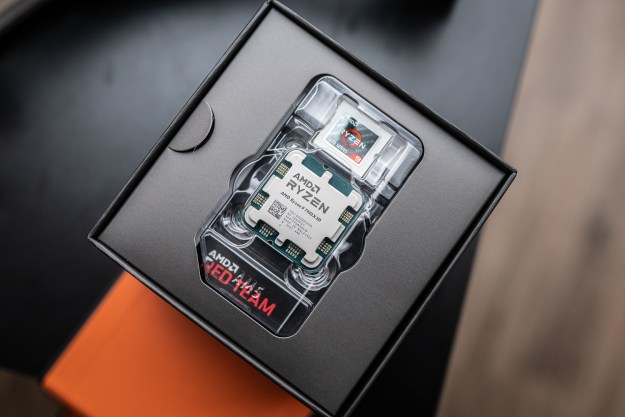Intel isn’t taking AMD’s new Ryzen processor lying down and has responded by launching a lineup of new processors at Computex 2017.
The Core X-Series, widely leaked before release, does not just focus on high-end successors to Intel’s previous Core i7-5960X and 6950X. It is a broad new series that spans from a four-core, four-thread Core i5 to a Core i9 (yes, Core i9 is now a thing) with 18 cores and 36 threads.
Technically, the X-Series is not new. The designation was already used for Intel’s fastest processors. But it was not much of a series, as it was limited to just Intel’s most powerful processor. As you can see in the table below, the new X-Series family provides an option at most budgets.
| Processor | Base Clock | Boost Clock | Cores | Threads | L3 Cache | Price |
| Intel Core i9-7980XE | N/A | N/A | 18 | 36 | N/A | $1,999 |
| Intel Core i9-7960X | N/A | N/A | 16 | 32 | N/A | $1,699 |
| Intel Core i9-7940X | N/A | N/A | 14 | 28 | N/A | $1,399 |
| Intel Core i9-7920X | N/A | N/A | 12 | 24 | N/A | $1,199 |
| Intel Core i9-7900X | 3.3 | 4.3 | 10 | 20 | 13.75MB | $999 |
| Intel Core i7-7820X | 3.6 | 4.3 | 8 | 16 | 11MB | $599 |
| Intel Core i7-7800X | 3.5 | 4.0 | 6 | 12 | 8.25MB | $389 |
| Intel Core i7-7740X | 4.3 | 4.5 | 4 | 8 | 8MB | $339 |
| Intel Core i5-7640X | 4.0 | 4.2 | 4 | 4 | 6MB | $242 |
The flagship is, of course, the Core i9-7980XE, which has 18 cores and 36 threads, and has earned the title of “Intel’s first teraflop processor.” Sneaking it in at Computex gives Intel an important morale victory of AMD, which recently announced its 16-core, 32-thread ‘Threadripper’ processor. The cost of the victory, however, is an incredible $2,000. We imagine AMD’s alternative will be less expensive.
Architecturally, the chips are a combination of Skylake and Kaby Lake hardware. Skylake is the foundation of everything with six cores or more, while Kaby Lake lies under the pair of four-core chips.
Given its scope, the focus of expanded Core X-Series might seem hard to understand. Still, Intel says it stands out in two ways: Platform and overclocking.
All Intel Core-X processors will use the new LGA 2066 socket, and run on the new Intel X299 platform, which is loaded with features. It supports up to 44 lanes of PCIe 3.0 bandwidth off the processor and 24 lanes for chipset I/O. Hardcore gamers can use that to run two cards at full PCIe x16 speed or four video cards at x8 speed, on motherboards with appropriate third-party support.
X299 also supports up to four-channel DDR4 2666 RAM. That is a big upgrade over the X99 platform. The first chipset to support DDR4, X99 was officially rated only for DDR4 2133. As you might expect, X299 supports Intel’s cutting-edge Optane memory. It can also support up to three Intel Rapid Storage Technology drives.
While the platform upgrades are nice, overclocking will be the winning feature for enthusiasts. All Intel Core X-Series processors will be unlocked. That massively increases the number of overclock-friendly chips available from Intel.
The massive core count on top-tier X-Series processors, combined with overclocking support across the range, has forced Intel to take cooling seriously. Intel recommends a closed-loop CPU liquid cooler for every processor in this line. Intel will sell its own option, the TS13X, which has a 150-millimeter radiator.
While most of the announcement focuses on the new chips and chipset, there are two feature changes in the processors themselves. The processors will support the latest Turbo Boost Max Technology 3.0, which can dynamically increase the clock speed of up to two cores above the usual limit, to maximize performance in workloads that are not heavily multi-threaded. Intel also announced support for the AVX-512 instruction set, though we are not aware of any consumer software that’ll take advantage of that tweak.
We are sure the pricing of the new X-Series will cause some controversy. The entry-level part only has four cores, and four threads yet sits at almost $250. That is in line with the six-core, 12-thread AMD Ryzen 5 1600X. Intel’s per-core performance is still quicker than AMD, however — and the clock speeds on Intel’s components are nothing to laugh at. Intel announced at the E3 PC Gaming Show in 2017 that pre-orders would open the week of June 18th, and we’ll update this post with further details as they become available.
Editors' Recommendations
- Gamers are reportedly returning Intel Core i9 CPUs in droves
- Here’s a shocking reminder of just how far ahead Intel is in race with AMD
- Intel’s Core Ultra CPUs are more Apple, less AMD
- Intel just made a huge comeback, and it’s bad news for AMD
- AMD’s upcoming Ryzen 5 5600X3D could completely dethrone Intel in budget builds


